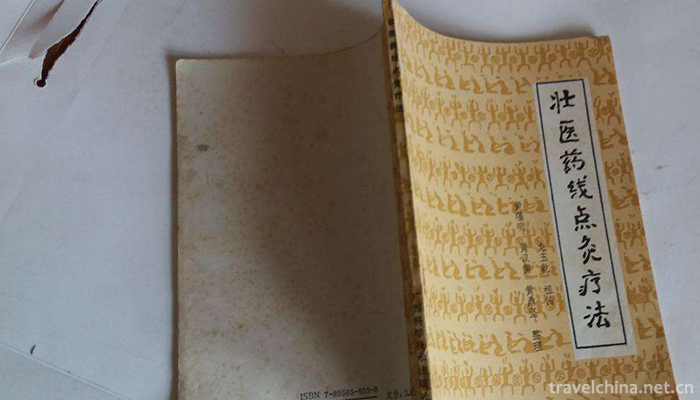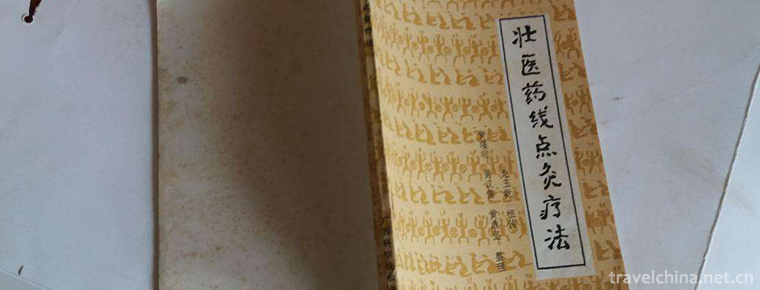Zhuang medicine thread moxibustion therapy
Zhuang medicine thread moxibustion therapy
Declaration area or unit: Guangxi College of Traditional Chinese Medicine
Zhuang medicine is the traditional medicine of the Zhuang people. It is a national traditional medicine based on the ancient Luoyue culture and Lingnan culture, with Yin and Yang as its foundation, Qiaowu (brain) as its main god, man, earth and three Qi synchronization, viscera, bones, flesh and blood as its body, airway, Valley and waterway as its "three roads" and "two roads" of Dragon Road and Fire Road as its use.
Drug thread moxibustion is one of the external therapies of Zhuang medicine. The medicinal thread used in Zhuang medicine is made of ramie, with diameters ranging from 0.25 mm to 0.7 mm and 1 mm. It is dried after soaking in medicinal water. When used, the medicine thread is ignited and the patients'body surface acupoints are ignited so as to dredge the Dragon Road and fire road. It has the functions of dispelling wind and removing arthralgia, relieving pain and itching, activating blood circulation and removing blood stasis, dissipating swelling and dispersing nodules. This treatment, ramie thread and soaked medicinal liquid, are local materials, herbal medicinal liquid prescription composition, according to the theory of Zhuang medicine prescription. The selected acupoints are plum blossom, lotus blossom, Changzi (both resembling their image) and experience points, and can also be used in acupuncture and moxibustion of traditional Chinese medicine.
There are more than 16 million people of Zhuang nationality in China, mainly distributed in Guangxi Zhuang Autonomous Region and Wenshan Zhuang Autonomous Prefecture of Yunnan Province. The application of Zhuang medicine mainly focuses on the Zhuang people, and the surrounding Miao, Yao and Dong nationalities also exchange and cross-use. The thread-point moxibustion therapy of Zhuang medicine, because of its convenient application and good curative effect, has been popularized to the whole country as a suitable technology in rural areas.


-
2.Tong li ancient town
Tongli Ancient Town belongs to Wujiang District, Suzhou City, Jiangsu Province. It was built in Song Dynasty. There are many gardens, temples, residences
Time 2018-12-06 -
3.Shanghai Gulf National Forest Park
Shanghai Bay National Forest Park is located in the May 4th Farm of Haiwan Town, Fengxian District, Shanghai, 60 kilometers from the center of Shanghai. It is a large artificial urban ecological fores
Time 2018-12-19 -
4.Strange Stones city in China
Located one kilometer north of Feixian Town, Linyi City, Shandong Province, China's largest ornamental stone base, national AAAA scenic spot, Shandong Province's key cultural tourism industry projects
Time 2018-12-22 -
5.Crab Island
Crab Island Green Eco-Resort is based on agriculture, characterized by villages, with environmental protection, green, organic and healthy as the solid connotation of tourism and vacation.
Time 2019-02-25 -
6.Zhanqiao
Qingdao Trestle Bridge is one of the scenic spots of Qingdao Seaside Scenic Spot. It is the first national scenic spot announced by the State Council in 1982, and also the first national AAAA-level sc
Time 2019-03-09 -
7.Bai opera
After 1949, on the basis of blowing tunes, Bai folk opera "Dabenqu" tunes were further enriched and improved, renamed "Baiju". The Lyric forms are basically sung in Bai language an
Time 2019-04-03 -
8.Tibetan Gugu Encouragement
Tibetan God inspiration has a long history. As for its origin, there is a legend that one or two hundred years ago, a "Gawa Hubo" (i.e. a local official) in Ningba village danced in the mans
Time 2019-04-05 -
9.Dang Tu folk songs
Dangtu Folk Song is one of the national intangible cultural heritages of the local traditional music in Ma'anshan City, Anhui Province.
Time 2019-04-25 -
10.Zhou Cuns Baking Cake Making Skills
Zhou Cun's baking technology has a history of more than 1,800 years. According to Zizhi Tongjian, in the three years since Emperor Heng of Han Dynasty Yanxi, Hucai vendors have been exiled in Shandong
Time 2019-08-10 -
11.Cuiyun corridor
Cuiyun corridor is a section of the ancient Shu Road, and also a section of Jianmen Shu Road, which is famous for its danger. Cuiyunlang, also known as "Huangbai" and "zhangfeibai" in ancient times, is located in Jiange County, Guangyuan City, Sichuan Province, and Zitong County, Mianyang City. Cuiyunlang in Jiange county has been built into a national AAAA scenic spot.
Time 2020-11-08 -
12.Suining social security
By the end of 2019, there were 23400 registered unemployed people in Suining, with the registered unemployment rate of 3.62%. 855000 people participated in the basic endowment insurance for urban employees, an increase of 114800 over the end of last year.
Time 2020-12-16